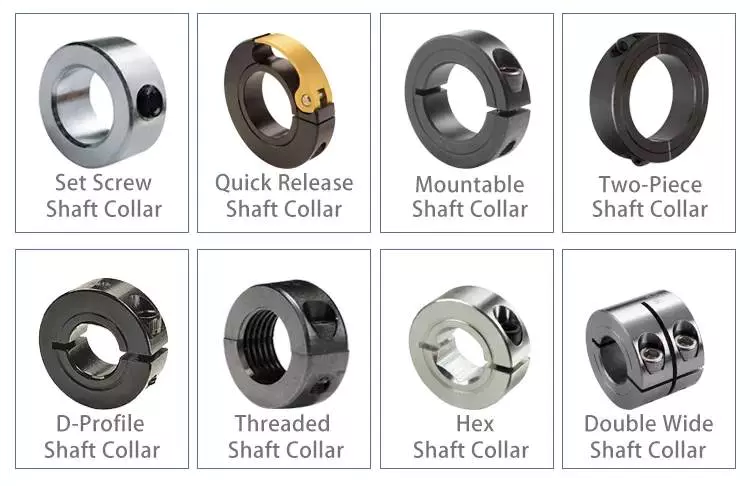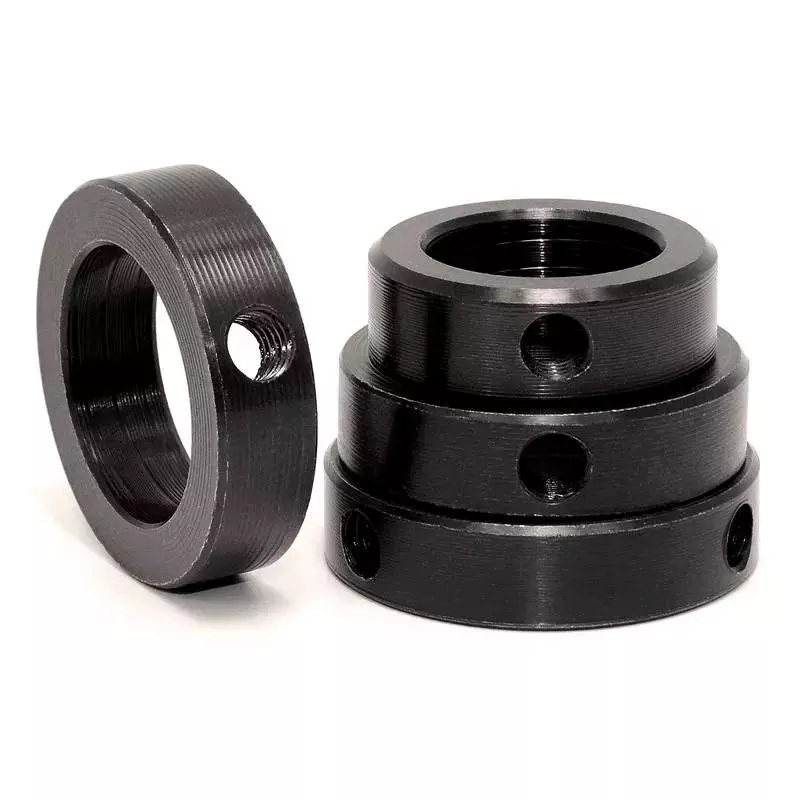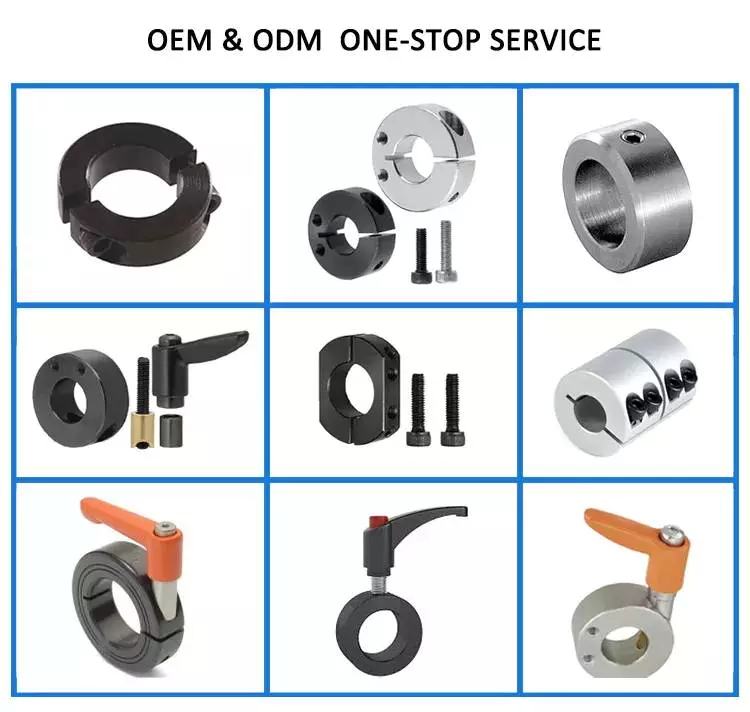Product Description
| Product Name | Shaft collar |
| Material | stainless steel, C45 |
| Weight | 13-620g |
| Bore | 1/2 in- 5 1/4 in |
| Item | hub and plate |
| Type | Set Screw/ single split / double split |
| packing | plastic bag +paper box +wooden box +wooden pallet |
1. Engineering: machine tools, foundry equipments, conveyors, compressors, painting systems, etc.
2. Pharmaceuticals& Food Processing: pulp mill blowers, conveyor in warehouse, agitators, grain, boiler, bakery machine, labeling machine, robots, etc.
3. Agriculture Industries: cultivator, rice winnower tractor, harvester, rice planter, farm equipment, etc.
4. Texitile Mills: looms, spinning, wrappers, high-speed auto looms, processing machine, twister, carding machine, ruler calendar machine, high speed winder, etc.
5. Printing Machinery: newspaper press, rotary machine, screen printer machine, linotype machine offset printer, etc.
6. Paper Industries: chipper roll grinder, cut off saw, edgers, flotation cell and chips saws, etc.
7. Building Construction Machinery: buffers, elevator floor polisher mixing machine, vibrator, hoists, crusher, etc.
8. Office Equipments: typewriter, plotters, camera, money drive, money sorting machine, data storage equipment, etc.
9. Glass and Plastic Industries: conveyor, carton sealers, grinders, creeper paper manufacturing machine, lintec backing, etc.
10. Home Appliances: vacuum cleaner, laundry machine, icecream machine, sewing machine, kitchen equipments, etc.
| Material: | Stainless Steel, C45 |
|---|---|
| Load: | Drive Shaft |
| Stiffness & Flexibility: | Flexible Shaft |
| Journal Diameter Dimensional Accuracy: | IT6-IT9 |
| Axis Shape: | Straight Shaft |
| Shaft Shape: | Real Axis |
| Samples: |
US$ 0.1/Piece
1 Piece(Min.Order) | |
|---|
| Customization: |
Available
| Customized Request |
|---|

Can I find information on alternatives to traditional shaft collars for specific applications?
Yes, information on alternatives to traditional shaft collars for specific applications is available. In addition to traditional shaft collars, there are various innovative solutions and alternative devices that can be used depending on the specific application requirements. Here are some sources where you can find information on alternatives to traditional shaft collars:
- Manufacturer Websites and Catalogs: Many manufacturers of mechanical components provide detailed information on their websites or in product catalogs about alternative devices or solutions to traditional shaft collars. These resources often highlight specific applications, industries, or challenges where alternative devices may be more suitable. Exploring manufacturer websites and requesting catalogs can help you discover innovative options.
- Technical Publications and Journals: Technical publications and journals focused on mechanical engineering, automation, or industrial applications often feature articles or case studies discussing alternative devices for various applications. These resources provide insights into the latest advancements and emerging technologies in the field. Accessing academic databases, engineering libraries, or subscribing to relevant publications can help you access this information.
- Engineering Conferences and Seminars: Attending engineering conferences, seminars, or workshops related to mechanical components or industrial automation can provide opportunities to learn about alternative devices through presentations, panel discussions, or technical sessions. These events often bring together experts, researchers, and industry professionals who share their knowledge and present innovative solutions. Checking event calendars, industry association websites, or engineering organizations can help you find relevant conferences or seminars.
- Online Engineering Forums and Communities: Online engineering forums, communities, and social media groups dedicated to mechanical engineering or industrial automation can be valuable sources of information on alternative devices. These platforms allow engineers and professionals to exchange ideas, discuss challenges, and share their experiences with different solutions. Participating in these forums, asking questions, or searching for relevant discussions can provide insights into alternative devices for specific applications.
- Consulting with Industry Experts: Seeking advice from industry experts, such as mechanical engineers, industrial automation specialists, or application consultants, can help you explore alternative devices tailored to your specific application requirements. These professionals have in-depth knowledge of the field and can provide personalized recommendations based on your needs. They can be contacted through engineering consulting firms, professional networks, or by reaching out to manufacturers directly.
When considering alternatives to traditional shaft collars, it is important to thoroughly evaluate the specific application requirements, including factors such as load capacity, precision, environmental conditions, space limitations, and maintenance considerations. Each alternative device may have its own advantages and limitations, and it is crucial to select the most suitable option based on the unique needs of your application.

Can I get recommendations for shaft collars suitable for different shaft diameters?
Yes, recommendations for shaft collars suitable for different shaft diameters can be obtained. Here are some ways to find suitable shaft collars for specific shaft diameters:
- Manufacturer Catalogs: Many shaft collar manufacturers provide catalogs or product listings that include detailed information about their collars, including the range of shaft diameters they can accommodate. These catalogs typically list the available collar sizes and their corresponding shaft diameter ranges. By referring to these catalogs, you can identify the collar models that are suitable for your specific shaft diameter.
- Online Retailers: Online retailers specializing in industrial supplies often have filtering options that allow you to search for shaft collars based on different criteria, including shaft diameter. You can input the desired shaft diameter as a filter parameter, and the retailer’s website will show you the available collar options that match your requirement. This can help you quickly identify suitable shaft collars from a range of brands and manufacturers.
- Industrial Distributors: Industrial distributors or suppliers that specialize in mechanical components may have knowledgeable staff who can provide recommendations based on your specific shaft diameter. They can guide you to the appropriate collar sizes and brands that are known to be compatible with your shaft diameter. These distributors often have access to a wide range of collar options and can assist you in finding the right solution for your needs.
- Online Forums and Communities: Engaging with online industrial forums, discussion boards, or communities related to mechanical components can be a valuable resource for seeking recommendations from industry professionals and experienced users. By posting inquiries about your specific shaft diameter and requirements, you can gather insights and suggestions from individuals who have encountered similar situations or have expertise in the field.
- Consulting with Engineers or Experts: If you have access to engineers or experts in mechanical engineering or industrial equipment, they can provide valuable recommendations based on their knowledge and experience. These professionals can assess your specific shaft diameter and application requirements and suggest suitable shaft collar options that meet your needs. They may consider factors such as load capacity, operating conditions, and any specific constraints or preferences you have.
When seeking recommendations, it is important to provide accurate information about the shaft diameter and any additional requirements or constraints you may have. This will ensure that the recommended shaft collars are compatible with your specific application and deliver optimal performance.

What are the different types of shaft collars available in the market?
In the market, there are various types of shaft collars available, each designed to meet specific application requirements. Here are some commonly used types of shaft collars:
- Set Screw Shaft Collars: Set screw shaft collars are the most common type and feature one or more set screws that tighten against the shaft to secure the collar in place. These collars have a simple design and are available in various materials such as steel, stainless steel, or aluminum. Set screw collars are easy to install and provide a reliable grip on the shaft.
- Clamping Shaft Collars: Clamping shaft collars use a clamping mechanism, such as a split design with two halves and bolts, to tighten around the shaft. They provide a strong and secure grip and are often used in applications where frequent adjustments or repositioning of the collar is required. Clamping collars are available in different materials and can provide excellent holding power.
- One-Piece Solid Shaft Collars: One-piece solid shaft collars are made from a single piece of material, typically metal, and have no moving parts. They are simple in design and provide a lightweight and compact solution for applications where space is limited. These collars are often used in light-duty applications or as a stop or spacer on a shaft.
- Two-Piece Split Shaft Collars: Two-piece split shaft collars consist of two halves that can be assembled and tightened around the shaft using screws or bolts. This design allows for easy installation and removal without the need to slide the collar along the shaft. Two-piece split collars are commonly used in applications where the shaft cannot be easily disassembled or where frequent adjustments are required.
- Threaded Shaft Collars: Threaded shaft collars have internal threads that allow them to be screwed onto a shaft. They provide a secure and adjustable grip when tightened against the shaft. Threaded collars are often used in applications where precise positioning or fine adjustment is needed.
- Hinged Shaft Collars: Hinged shaft collars feature a hinge mechanism that allows for easy installation and removal without completely disassembling the collar. They are often used in applications where frequent access to the shaft is required or when the collar needs to be quickly repositioned or replaced.
- Flanged Shaft Collars: Flanged shaft collars have an extended flange on one side, which provides additional support and acts as a stopping point for other components. The flange helps prevent axial movement of the collar and provides a reference surface for locating or positioning other elements, such as bearings, gears, or pulleys.
- Specialty Shaft Collars: In addition to the standard types mentioned above, there are specialized shaft collars designed for specific applications. These include torque-limiting collars, indexing collars, quick-release collars, and shaft collars with integrated components such as gears or pulleys. These specialty collars cater to specific needs and offer unique features to enhance functionality or simplify assembly.
The choice of shaft collar type depends on factors such as the application requirements, shaft size, load capacity, ease of installation, and adjustability. It’s important to select the appropriate type of shaft collar that best suits your specific application to ensure proper functionality and secure shaft positioning within the mechanical system.


editor by CX 2023-11-07